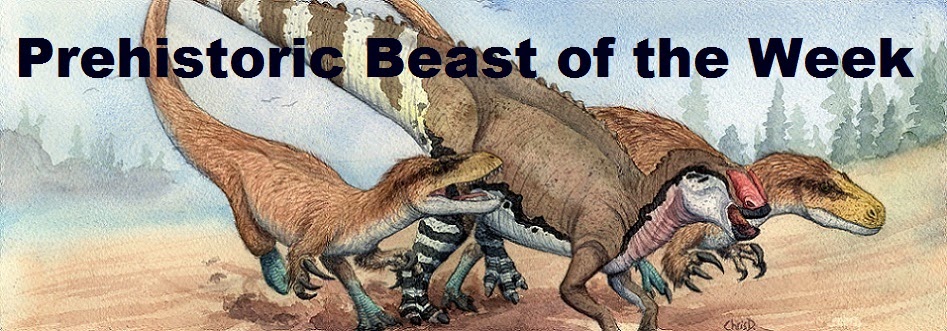 |
| Watercolor reconstruction of Asfaltovenator vialidadi by Christopher DiPiazza |
Asfaltovenator was a meat-eating dinosaur that lived in what is now Argentina during the middle Jurassic period, between 174 and 170 million years ago. It measured about twenty five feet long from snout to tail. The genus name translates to "Asfalto Hunter" after the Asfalto rock formation in Chubut Province, Argentina, where its bones were discovered.
 |
| Asfaltovenator's skull. Image from 2019 paper by Rauhut and Pol. |
Asfaltovenator is known from almost the entire front half of its body, including the skull, ribs, arms, claws, and parts of the legs and pelvis. Its skull was narrow laterally, but very deep, with two small bony ridges before the eyes. The eye sockets were narrow, suggesting it had proportionally small eyes, and relatively large nasal holes where the nostrils would be. The teeth were long and blade-like, ideal for slicing chunks of meat off bones. A unique characteristic that wouldn't be seen in life, is two of the vertebra just behind the skull had neural arches that were pointed and angled backwards, like little shark fins. The arms were powerful and were each armed with three claws. The first digit on each hand had the longest claw, which were curved like massive hooks.
 |
| Neck vertebrae from Asfaltovenator. Note the neural arches on top that resemble little shark fins. Image from 2019 paper by Rauhut and Pol. |
Where exactly Asfaltovenator fits on the dinosaur family tree is interesting since it has a mixture of basal and derived theropod dinosaur traits. As of now, however, it appears that it was a very early member of the allosauroid group, which includes Metriacanthosaurus, the more famous Allosaurus, and the larger Acrocanthosaurus, to name a few examples. It also shares some characteristics with megaosaurids, like Megalosaurus, though.
That is all for this week! As always feel free to comment below!
References
Rauhut, Oliver W. M.; Pol, Diego (2019-12-11). "Probable basal allosauroid from the early Middle Jurassic Cañadón Asfalto Formation of Argentina highlights phylogenetic uncertainty in tetanuran theropod dinosaurs. Scientific Reports. 9 (1): 18826.

No comments:
Post a Comment